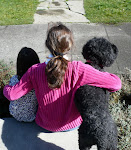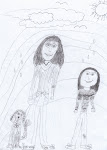Thankfully, I don’t need the tissues today.
I am sitting in a large cushioned armchair talking with Jonna, a child therapist I tracked down and met with last spring. (My daughter met her back then too.) She’s a petite, brown haired woman probably in her mid to late fifties with a lean, angular body. She sits in the other oversized armchair facing me. Just like our visit last spring, she’s slipped off her shoes and tucked stocking feet up snug under her thighs. She leans to one side, balancing a small notebook in her lap. Her arm lies casually draped over her thigh and a pen dangles loosely between two fingers. She listens intently, focusing round, birdlike eyes on me. Her face is lined with wrinkles -- as if she’s taken on the cumulative cares of her clients. I like this woman for her compassion, for her work with children, but even more -- for her direct, no-nonsense feedback.
I tell her about the events of the past week. About my daughter’s fears and worries. About confronting the truths of her story. Then too, I tell her of the night my girl asked to re-read her Homecoming story, outloud, together. How it felt like coming full circle, a joyful celebration.
Jonna tells me it’s common for adopted children to have these fantasies and fears. What’s more unusual is for grade school children to share their concerns so openly with their adoptive parents. Many are afraid to air their feelings. They stuff them and hold them inside, then wrestle with their confusion, or anger, in their teen years. (I’m afraid of the teen years.)
Jonna reaffirms what she told me last spring. That my daughter is perceptive, and emotionally solid. That abandonment is the most profound, fundamental fear we face as humans. That she needs to be able to grieve, and that grieving is a process. That these issues will come up for her again, in different ways, but that the first time is usually the hardest. And, that it’s a testament to her courage, our relationship, she can be so honest with me.
So… how are you doing in all this? Jonna asks.
I concede it hasn’t been easy but, with each passing day, I am grateful – indeed immensely grateful -- for my daughter’s courage, her willingness to trust in me. It tears me up to witness her pain and yet, I stand in awe of her strength.
I admit, with trepidation, I’ve been writing about our journey, sharing our story -- anonymously – in a blog I started. I’m scared Jonna will tell me I am betraying my daughter’s trust. Which is the reason why I know I should tell her about the blog. To get her candid assessment. Do I kill the blog? I don’t want to kill the blog. Writing about all the ups and downs of this journey helps me make sense of it all.
Jonna’s answer is not what I expect.
This is your story too. You’re entitled to a life as well.
I pause, and swallow an unexpected lump.
Damn. I do need one of those tissues today.







1 comment:
"Jonna tells me it’s common for adopted children to have these fantasies and fears. What’s more unusual is for grade school children to share their concerns so openly with their adoptive parents. Many are afraid to air their feelings. They stuff them and hold them inside, then wrestle with their confusion, or anger, in their teen years. (I’m afraid of the teen years.)"
I'm afraid of the teen years too! My son also share his concerns very openly - not just with us but also with his teacher at school. I also try to look at the positive, that this is part of the healing process and that all the grief work we've done at home makes these conversations possible. "It's okay to cry," is one phrase that we seem to say a lot. "Sad things have happened to you. It makes sense that you would cry about them sometime."
Post a Comment